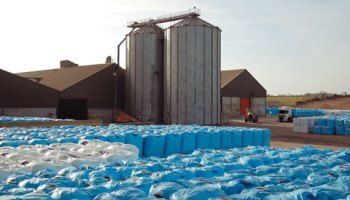The Nigeria Sovereign Investment Authority (NSIA) has begun restructuring the Presidential Fertiliser Initiative (PFI), the NSIA’s Communications Officer, Mr Titilope Olubiyi, has said.
The statement said that this was to make the programme more sustainable, following its successes and transformative impact over the past four years.
The NSIA said that within four years of its implementation the initiative had delivered on key outcomes, including over 30 million bags of NPK 20:10:10 spanning the project’s life-cycle.
Price reduction on fertiliser from over N10,000 to under N5,500, 41 resuscitated blending plants from an initial number of four plants at project inception.
It also ensured an estimated 250,000 jobs across the agriculture value chains, including in logistics, ports, bagging, rail, industrial warehousing and haulage touchpoints, amongst others.
The NSIA said the initiative also saved foreign exchange in excess of 350million dollars as against erstwhile payments on subsidy and import substitution.
It added that the presidency approved the restructuring of the PFI program, starting from the 2021 cycle, with some major modifications.
The NSIA, under PFI, would transition into an upstream player, thereby limiting its involvement to importation, storage and the wholesale of raw materials to blenders.
Additionally, the NSIA subsidiary, NAIC-NPK Limited, would be spun off to the Ministry of Finance Incorporated (MoFI).
It also said that blenders would no longer be paid blending fees by NAIC-NPK, rather, they would recover their costs directly from selling the fertiliser to the market.
This would balance the incentives of the business and ensure that the blenders built the right capacity to actively participate in the local supply sub-sector, it said.
“Blending plants will provide bank guarantees to cover requisitioned raw materials demand appropriated for their respective production volumes.
“As part of the new structure and in line with the presidential directive, the Ministry of Finance, Budget and National Planning and the Central Bank of Nigeria (CBN), are expected to engage commercial banks to facilitate lines of concessionary credits to blending plants for the purchase of raw materials.
“It is also expected that the CBN will ensure that the foreign exchange needed for the program is provided, when needed to cover some raw materials.”
The statement said that under the new arrangement, blenders would be responsible for the bulk of activities in the fertiliser production value chain, such as transporting the raw materials, sourcing filler, blending the fertiliser and selling to off-takers.
It added that the Ministry of Agriculture and Rural Development would perform its statutory monitoring and quality control role over blenders’ activities.
According to the NSIA, the approval of the new approach takes immediate effect with various benefits attached.
It said it would unlock more development finance, such as loans and investments, into the local fertiliser blending value chain in the country.
Other benefits include, reduction of food price inflation in the market as availability of fertiliser will drive down the price or cost of food products.
Mr Mohammed Badaru, Governor of Jigawa state and Chairman, Implementing Committee of PFI, said that the programme had in many ways served to augment the administration’s policy-driven programmes to diversify the Nigerian economy.
He said it had also bolstered Nigeria’s industrial base, resuscitated and strengthened domestic production capacity of fertiliser and eliminated the huge fertiliser subsidy burden placed on the Federal Government.
“Clearly, the programme is a strong value proposition for the nation in the agriculture space, given the variety of socio-economic benefits it presents.
“We are grateful to Mr President for creating this programme and we look forward to supporting the next phase as it evolves.”
Mr Uche Orji, the Managing Director of NSIA, said the programme had accomplished its principal objectives with the support of President Muhammadu Buhari.
He added that the programme had fulfilled the establishment, stabilisation and market discipline phase of PFI whose primary objective was to revive the blending plants and create a viable domestic blending industry.
“We believe the PFI should gradually evolve into the next phase, which is a tactical withdrawal of intervention in the industry and the emergence of a self-sufficient, sustainable, and efficiently operated market.
“NSIA is pleased with the government’s decision and looks forward to seeing the innovation and creativity which will characterise the open market in the sector.”
Mr Thomas Etuh, Chairman, Fertiliser Producers and Suppliers Association of Nigeria (FEPSAN), said the restructuring was a welcome development for FEPSAN.
He said that the new approach would afford operators the opportunity to build a recognisable and trusted brand while ramping up distribution nationwide.




